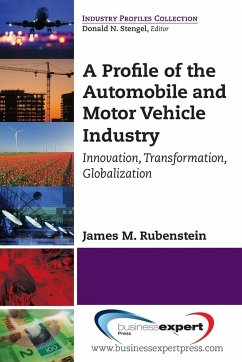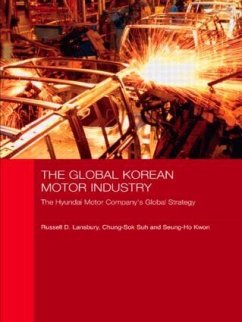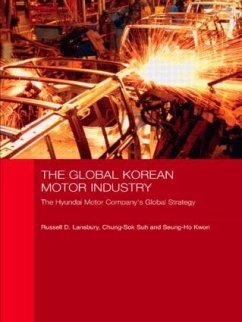
Global Alliances in the Motor Vehicle Industry
Versandkostenfrei!
Versandfertig in 1-2 Wochen
88,99 €
inkl. MwSt.

PAYBACK Punkte
44 °P sammeln!
The globalization of the motor vehicle industry-specifically, cars and light trucks-has engendered new forms of competition and cooperation with less regard for national boundaries than ever before. The DaimlerChrysler merger, the GM-Toyota joint venture, the Renault equity stake in Nissan, the Ford takeover of Mazda, Jaguar, and Volvo cars, and direct foreign investments in Mexico, Mercosur (Mercado Com^D'un del Sur), China, and India-developments like these are almost impossible to keep up with. Hiraoka, a prize-winning analyst of manufacturing excellence in the automotive industry, surveys ...
The globalization of the motor vehicle industry-specifically, cars and light trucks-has engendered new forms of competition and cooperation with less regard for national boundaries than ever before. The DaimlerChrysler merger, the GM-Toyota joint venture, the Renault equity stake in Nissan, the Ford takeover of Mazda, Jaguar, and Volvo cars, and direct foreign investments in Mexico, Mercosur (Mercado Com^D'un del Sur), China, and India-developments like these are almost impossible to keep up with. Hiraoka, a prize-winning analyst of manufacturing excellence in the automotive industry, surveys them and their causes and presents a clarifying picture with thoroughness and depth. Hiraoka's explanation of the various factors contributing to globalization of the motor vehicle industry provides the background information necessary to gain perspective on recent events. These developments include e-commerce networks, alliances with local and far-flung parts suppliers, low-cost mass production and distribution systems, the launching of hybrid products in mature economies, and the buildup of capacity in emerging markets. His analysis ranges widely, delving into managerial reactions to regional free-trade blocks, currency crises, government shifts away from central planning and trade protectionism, the vicissitudes of business cycles in emerging markets, and the juxtaposition of Japan's prolonged recession and the booming American motor vehicle market. Corporate decision-makers, labor leaders, policy analysts, researchers, students, and industry observers will benefit from understanding the global characteristics of today's motor vehicle industry.












